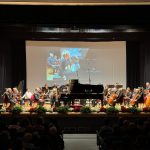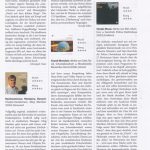Oleg Marshev Test Drives Whangarei’s Refurbished Steinway
April 23, 2013
 New Zealand Debussy, Mussorgsky: Oleg Marshev (piano), Capitaine Bougainville Theatre, Forum North, Whangarei, Northland, New Zealand, 9.4.2013 [PSe]
New Zealand Debussy, Mussorgsky: Oleg Marshev (piano), Capitaine Bougainville Theatre, Forum North, Whangarei, Northland, New Zealand, 9.4.2013 [PSe]
Debussy: Préludes, Book II
Mussorgsky: Pictures at an Exhibition
Happy accidents don’t happen all that often – but then, I suppose, if they did we wouldn’t think them anything remarkable, would we? What fascinates me is how two completely independent courses of action can worm their ways along two utterly unconnected timelines, end up at the exact same point in the space-time continuum, and strike sparks of fairy-dust (or something on those lines).
What makes the happy accident I have in mind even more remarkable is that it involves a District Council. Some thirty years ago the people of Whangarei acquired, through public subscription, a Steinway grand piano, which they entrusted to the care of the Council. Going on for 29 years later, the Council decided that the piano’s annual service must be about due; – that is, they arranged for the poor, overworked – and fairly dilapidated – beastie to be completely refurbished. This took a year and cost NZ$50,000 (so, naturally, numerous citizens complained about using ratepayers’ money to benefit a well-to-do minority – conveniently overlooking whose piano it was, and just how many diverse “minorities” it benefited).
Now, try to put the last paragraph out of your mind whilst you read this one! About a year ago, Oleg Marshev was busy trying to re-establish his regular NZ recital tours. He negotiated successfully with numerous customers, including Whangarei Music Society (WMS). Although very happy that Marshev’s return had been assured, WMS felt disappointed knowing that Forum North’s Steinway was out of commission, and that Marshev would have to play their own, somewhat less exalted piano.
In his career Marshev – who hails from Baku, the capital of Azerbaijan – has won many laurels and appeared at numerous “prestigious” venues (yet, curiously, remains probably the greatest living pianist never to have appeared at the Proms). You can of course find all that sort of thing in the standard “blurbs”, but less often mentioned is the impressive array of recordings he has made, over the years, for the small (but beautifully marked) Danish company Danacord, many of which have been reviewed by MusicWeb.
These give you a very good idea what sort of pianist Marshev is. You’ll find all the trappings of a “virtuoso showman” – extreme digital dexterity, technical mastery, impressive dynamic range and so on. But you won’t actually find a “showman”, virtuoso or otherwise, for Marshev is one of those rarer birds, one who first and foremost plays music. To him, virtuosity is just another “weapon” in his technical “arsenal”, to be called on when necessary to best serve the music he’s playing.
This impression is, if anything, merely reinforced by seeing him at work. Closed eyes, upturned eyebrows, bending over backwards, swooning, swaying, ecstatic expressions bordering on physical anguish – in short, the symptoms of overacting – are (I’ll hedge my bets, and say “almost always”!) conspicuous by their absence. Basically, Marshev doesn’t muck about, he just gets on with the job. His body-language tells you just two things: firstly, that he’s moving mainly as necessary to play the notes, and secondly, that he’s thinking – focussing on the final step in realising, as best he can, what he believes the music is saying. Of course, it helps that Marshev has real, and often original insight – that ability to take music we think we know well, and make us wonder about it all over again. I should add that I’m not suggesting that Marshev is unique – but he is in very select company.
The two time-lines collided when it was confirmed that the renovated instrument would be back on-site and “ready for blast-off”, with literally only a day or so to spare before Marshev’s scheduled recital and, in view of the aforementioned, who better than Marshev to “test drive” the newly-refurbished Steinway? And, for that matter, what better music to put it through its paces than Marshev’s current “pictorial” programme?
I get the impression that, throughout its first century, composers accepted the piano for what it was – you pressed the keys, and it made the sound that pianos make. Then along came Debussy, who blew the lid off that idea, by unveiling a previously unimagined world of pianistic colour.
Fast forward another century, and along came Marshev who – before our very ears – sidestepped persistent performance habits, to revitalise Debussy’s extraordinary pianistic palette. Purged of all excessive mush, his performance of the Préludes (Book II) restored the impressionistic haze to its proper perspective, balanced against and contrasted with gleaming, glinting, crystal clarity.
So it was that the opening Brouillards was not a traditional “London pea-souper”; instead the eponymous and plural “mists” drifted by, obscuring the scene only intermittently; Feuilles Mortes (“Dead Leaves”) were given their appropriate brittleness; No. 6’s razor-sharp rendition strongly suggested a bibulous origin for Général Lavine’s eccentricity; Marshev’s Ondine seemed slightly sedate for a scherzando, because, as it transpired, Marshev was giving himself room – firstly to pull focus on the marvellous colours, and secondly to give the music’s surges of momentum their due without any indecorous haste, and, well . . . another eight gems newly-illuminated, culminating in a fizzing Feux d’Artifice in which Marshev did indeed call on his technical virtuosity, his flying fingers striking showers of spectacular sparks.
Taking a step back, Mussorgsky’s thoroughly nineteenth-century Pictures at an Exhibition reflects real rather than imaginary images – and I couldn’t care less whether it’s really “at” or “from”. Granted, the work features a selection of pictures taken “from” an exhibition, but Mussorgsky’s recurrent Promenadeis clearly intended to present them as being seen “at” an exhibition. Inevitably, virtuoso showmen almost without number have eagerly seized upon it as the musical equivalent of a “blockbuster movie”. Yet, while indeed a work of immense cumulative power, it is also a heartfelt elegy.
Although Marshev was as forceful as any when necessary – his fearsomely savage Baba Yaga indeed seemed hell-bent on destruction-testing the Steinway – this elegiac element quite rightly dictated his overall view of the work. In particular, at the critical turning-point, those baleful chords of Catacombsthat interrupt the headlong progress of The Market at Limoges were not crashed out fortissimo (as is often the case, possibly under the influence of orchestrations, notably Ravel’s), but declaimed relatively dolce (as is, apparently, marked by Mussorgsky). It’s still a shocking reversal but, rather than being merely horrific, it’s intensely, intimately dismaying.
However, Marshev’s long view was certainly not at the expense of a welter of incidental delights, high on my list of which comes his scrumptious, scrupulously-observed Ballet of the Unhatched Chicks, a feather-light, madcap vignette filled with flustered fluttering, cheeping and pecking, and here sporting some of the sweetest trills that have ever tingled my spine.
Following the thunderous climax of The Great Gate at Kiev, and some well-deserved thunderous applause, Marshev gently soothed our fevered brows with the balm of a Siloti arrangement of a Bach Prelude, ensuring that we departed in a fit state to drive home.
This encore must have been especially welcome to one listener – the piano restorer. David Jenkin, had been dancing on pins, as nervous as an expectant father. You may be wondering how the refurbished piano sounded? Let’s put it this way: you couldn’t actually hear the piano – you could only hear the glorious music emerging from it.
Paul Serotsky


